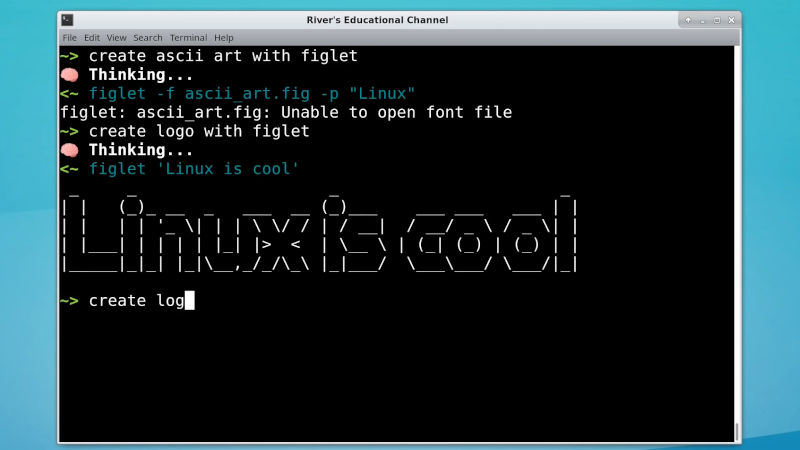We are always envious of the Star Trek Enterprise computers. You can just sort of ask them a hazy question and they will — usually — figure out what you want. Even the automatic doors seemed to know the difference between someone walking into a turbolift versus someone being thrown into the door during a fight. [River] decided to try his new API keys for the private beta of an AI service to generate Linux commands based on a description. How does it work? Watch the video below and find out.
Some examples work fairly well. In response to “email the Rickroll video to Jeff Bezos,” the system produced a curl command and an e-mail to what we assume is the right place. “Find all files in the current directory bigger than 1 GB” works, too.
Of course, like most AI projects, it can get confused easily. “Generate an image of three giraffes” creates a blank image. Asking it to download some files seemed to confuse it, too, for some reason. Having it suggest what hard drive to format spooked us a little. At least it waited for you to confirm its guess.
Because of the licensing and cost, you can’t really duplicate this exactly, although if you are savvy enough with deep learning models, you might be able to get close. However, we can’t help but think there are better ways to approach this problem.
Not to mention, shell commands aren’t that hard. We like regular expressions, but based on how many times we have to write one for someone else, maybe an AI to make them easier would be interesting. There again, we have a different approach.

















hello computer
hello….
?
hm… not working
I must using keyboard myself?
There’s only one command it must obey:
“Tea, Earl Grey, hot!”
I always thought that was strange, because he would just order “tea”, and the computer would know the kind he always gets.
Hilarious. The combination of ambiguity and total honesty can make for some embarrassing moments.
Don’t order “the usual” in the holodeck.
Especially if Barclay has been using it lately.
I thought the fan theory was its a habit he picked up from using older not-as-good AI?
AI could spot connection between tea and dildo. Rumor has it that Earl was Sasha’s grandpa.
“I can’t do that Dave, it is not a Alphabet product”
Today’s fish is Trout a la Crème. Enjoy your meal.
I hate fresh trout. My least-hated, favorite fish would be sole. That way you don’t have to see the eyes. Sole has no eyes
FISH!….. FISH!…… FISH!….. FISH!…… FISH!…. FISH!….
Oh, I will ;)
Airplane! Don’t Eat the Fish!
https://www.youtube.com/watch?v=DkGR65CXaNA
Fish!
sudo make me a sandwich
Can’t wait to have Amelia Bedelia in my machine.
They mailed him a literal key, what do they engrave the numeric code key on the back or something?
https://youtu.be/uyV0IVItlM4
This should be built in! Or a GUI on the client side with auto complete and suggestion! 2021 my ass.
“We like regular expressions”
this place is turning into The Onion now.
or and S&M rag.
Hackaday style is to use “we” unless it’s a personal or idiosyncratic opinion/experience.
In this respect, Al got it wrong here. :) “We” do not love regexes.
Two things. First, in many of those cases, it is simpler and faster just to type the command you want to have executed. Second, in those where that is not true, a simple script with a short name will be far more convenient.
Nice, but like the personal assistants, not all that compelling.
I think this is more for a natural language way of executing tasks where you don’t have all of the niche tools & arguments memorised. For non-routine tasks, pawing through man pages is what usually most consumes time, not typing out the final command.
Also, this could be very useful/fun for use as a nerd-worthy speech controlled personal/home assistant.
It might be handy for people like me who need to use the CLI, but not often enough to learn much of anything. CLI is super slow and inefficient if you don’t already know how to do something, at that point it’s basically just programming, and programming takes time.
SysAdmin : “Computer. Forcibly remove all files under directory”
Computer : “Forcibly removing all files under the default root directory”
Ugh, comments cut out the keyword in brackets..
“under [unintelligible] directory”
I feel like there could have been enough ambiguity for the computer to interpret it that way even without the [] part. you never specified which directory so it just goes for the default which happens to be your root xD
If you run a wild wee beastie as root, you deserve whatever you get. lol
My favorite bash addon is “thef*ck”, where you just type “f*ck” and it pretty smartly tries to correct your last command. Typos, forgot sudo, missing package, all corrected by AI just by swearing. The future is here already
Would be good to have a combined man/info/apropos that used an AI to help you search and then presented relevant examples but I do not like the way the system currently works, and I would rather run it locally on our LAN as a service rather than leaking information to OpenAI.
Today.
I was today years old when someone, finally, FINALLY, did something f**ing useful with AI.
good job.